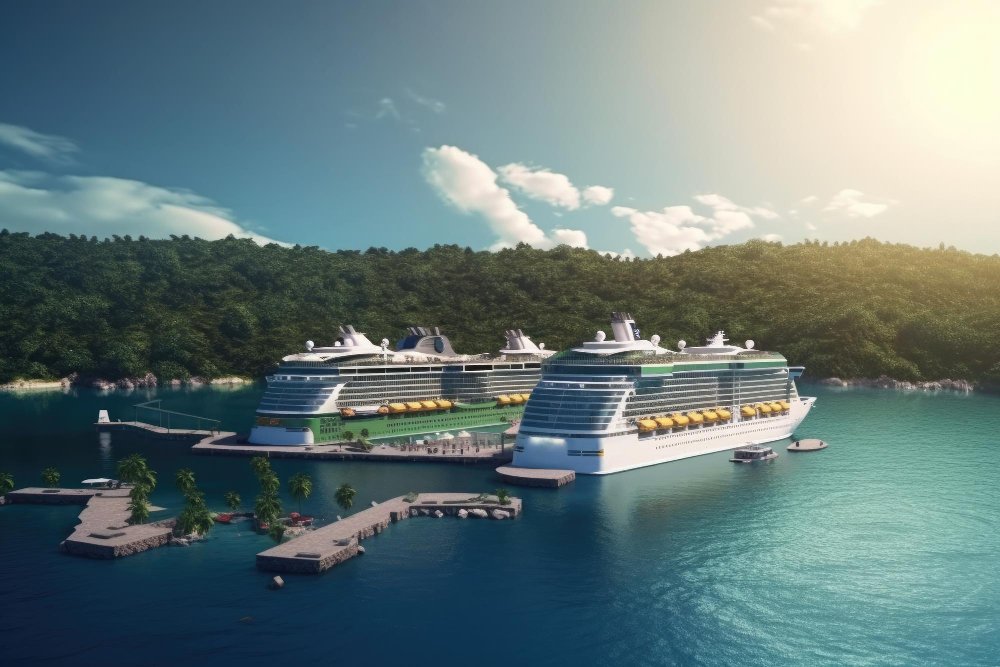Sustainability and Innovation in Modern Cruise Travel
Cruising has long been associated with luxury, exploration, and leisure, but as concerns about environmental impacts grow, the cruise industry is undergoing a transformation. Sustainability and innovation are at the forefront of this evolution, as companies strive to minimize their ecological footprint while providing exceptional travel experiences. Today’s travelers expect not only comfort and entertainment but also environmental responsibility. From advancements in ship design to cutting-edge technologies, the cruise industry is embracing new approaches that promote sustainability and protect the destinations it visits.
The Rise of Sustainable Cruise Practices
In response to growing environmental concerns, cruise lines have committed to reducing emissions, minimizing waste, and adopting sustainable practices. The International Maritime Organization (IMO) has implemented strict regulations to cut sulfur emissions and improve fuel efficiency in the shipping industry, prompting cruise companies to rethink their operations.
Cleaner Fuels and Energy Efficiency
One of the most significant changes in cruise travel is the transition to cleaner fuels. Many modern cruise ships are now powered by liquefied natural gas (LNG), which produces fewer greenhouse gasses and air pollutants compared to traditional marine fuels. LNG-powered ships are not only more efficient but also reduce sulfur emissions by up to 99%, particulate matter by 85%, and nitrogen oxide emissions by up to 80%. This shift is a critical step in making cruise travel more sustainable.
In addition to LNG, ships are incorporating energy-efficient technologies, such as advanced propulsion systems and hull designs that reduce drag, resulting in lower fuel consumption. Cruise ships are also utilizing renewable energy sources, like solar panels, to power onboard systems. These innovations reduce the environmental impact of cruising while maintaining the luxury and convenience that travelers expect.
Exhaust Gas Cleaning Systems (Scrubbers)
For ships that continue to rely on traditional marine fuels, exhaust gas cleaning systems, or scrubbers, have become an essential technology. Scrubbers remove sulfur dioxide and other pollutants from exhaust gases before they are released into the atmosphere, allowing ships to meet stricter emissions standards. These systems are a temporary solution as the industry continues to move towards cleaner fuels and technologies, but they are an important step in mitigating environmental damage.
Shore Power Connections
When cruise ships are docked at port, they typically keep their engines running to maintain power for onboard systems. This practice, known as “idling,” can lead to significant air pollution in port cities. However, shore power connections allow ships to plug into the local electrical grid, reducing the need for engine use and minimizing emissions.
More ports around the world are installing shore power infrastructure, enabling cruise ships to operate more sustainably while in port. This not only benefits the environment but also improves air quality for the residents of port cities, many of which rely heavily on tourism.
Waste Management and Recycling
Waste management is another critical area where the cruise industry is making strides towards sustainability. Cruise ships, which are essentially floating cities, generate significant amounts of waste. Managing this waste responsibly is essential to reducing the environmental impact of cruising.
Advanced Waste Treatment Systems
Modern cruise ships are equipped with advanced waste treatment systems that process sewage, food waste, and other refuse onboard. These systems break down waste into non-harmful components, reducing the amount of waste that needs to be disposed of at sea or onshore. Some ships also employ waste-to-energy systems, which convert waste into usable energy, further reducing their environmental footprint.
Recycling Initiatives
Many cruise lines have implemented extensive recycling programs to minimize waste. These initiatives include sorting and recycling plastics, metals, glass, and paper onboard. Some cruise ships are even working to eliminate single-use plastics, opting for reusable or biodegradable alternatives. By reducing plastic waste, the industry is helping to protect marine ecosystems, which are particularly vulnerable to plastic pollution.
Water Conservation and Desalination
Water conservation is another priority for sustainable cruising. Cruise ships require large amounts of fresh water for their passengers and crew, but sourcing water responsibly is essential, especially when visiting regions with limited water resources.
Desalination Plants
Many modern ships are equipped with desalination plants that convert seawater into freshwater. This technology not only ensures a steady supply of water for the ship but also reduces the reliance on local water sources in ports of call. Desalination plants allow cruise ships to operate more sustainably by reducing the strain on coastal communities and minimizing the environmental impact of water use.
Water-Saving Technologies
In addition to desalination, cruise lines are adopting water-saving technologies to further reduce consumption. Low-flow toilets, showerheads, and faucets are standard on modern ships, helping to conserve water without sacrificing comfort. Some cruise lines are also encouraging passengers to reuse towels and linens to cut down on water and energy use in laundry facilities.
Eco-Friendly Shore Excursions
The sustainability efforts of the cruise industry extend beyond the ship itself. Shore excursions are an integral part of the cruise experience, but they can also have a significant impact on local environments and communities. Many cruise lines are now offering eco-friendly excursions that promote responsible tourism and minimize environmental damage.
Supporting Local Economies
One of the ways cruise lines are contributing to sustainability is by supporting local economies. By partnering with local tour operators and businesses, cruise companies help create jobs and foster economic growth in the regions they visit. This approach not only benefits the communities but also provides passengers with more authentic and meaningful experiences.
Wildlife Conservation and Responsible Tourism
Many shore excursions now focus on wildlife conservation and responsible tourism. These excursions are designed to educate passengers about the importance of protecting fragile ecosystems while allowing them to experience the natural beauty of a destination in a sustainable way. For example, cruises to Alaska often include guided wildlife tours led by local experts, who emphasize the importance of conservation while showcasing the region’s rich biodiversity.
Innovation in Ship Design and Operations
In addition to sustainability initiatives, innovation is driving the future of cruise travel. New technologies and design improvements are making ships more efficient, comfortable, and eco-friendly.
Smart Ships and Automation
The rise of “smart ships” is transforming the way cruise lines operate. These ships are equipped with sensors and automation systems that monitor and optimize energy use, water consumption, and waste management in real-time. Smart ships also offer personalized experiences for passengers, using data to tailor services and enhance comfort while improving operational efficiency.
Additionally, modern cruise ships are designed to maximize energy efficiency. For example, improved hull designs reduce drag and allow ships to travel farther with less fuel. Energy-efficient lighting, heating, and cooling systems also contribute to the ship’s overall sustainability.
Electric and Hybrid Propulsion
The future of cruise travel may lie in electric and hybrid propulsion systems. Several companies are experimenting with electric engines powered by renewable energy sources, such as solar or wind power. Hybrid ships, which combine traditional fuel engines with battery-powered systems, are also being developed. These advancements have the potential to significantly reduce the environmental impact of cruising while maintaining the luxurious experience that passengers expect.
The Role of Cruise Ship Jobs in Sustainability
Behind every sustainable cruise is a team of dedicated professionals working to implement these innovations and practices. Cruise ship jobs related to environmental management, waste treatment, and energy efficiency are becoming increasingly important as the industry strives to meet new environmental standards. From engineers to environmental officers, these roles ensure that the ship operates as sustainably as possible while delivering a high-quality experience for passengers.
Conclusion
Sustainability and innovation are transforming the modern cruise industry. With cleaner fuels, energy-efficient technologies, and responsible waste management, cruise lines are reducing their environmental impact and paving the way for a more sustainable future. As travelers become more conscious of their ecological footprint, these innovations are helping the cruise industry evolve to meet new expectations without compromising on the luxury and excitement that make cruising so appealing. Whether through eco-friendly shore excursions or cutting-edge ship design, the future of cruise travel is one where adventure and sustainability go hand in hand.







